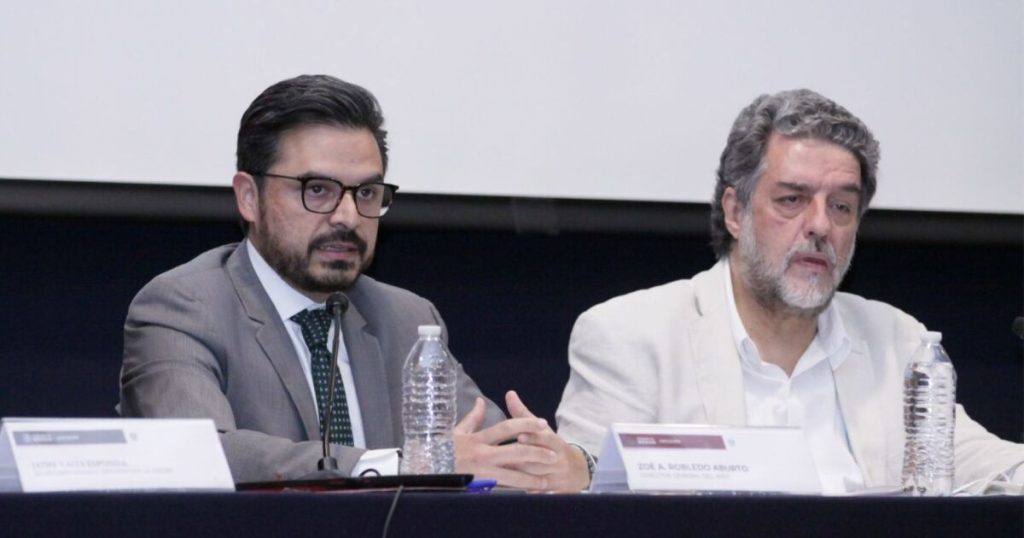In an inter-institutional effort to advance the educational transformation in health, committees will be formed that will allow to identify the proposals of the different actors in the sector, with a view to formulating an action plan.
This was determined during a working meeting by the Secretaries of Public Education (SEP), Health, the Mexican Institute of Social Security (IMSS), the National Autonomous University of Mexico (UNAM), the National Association of Universities and Higher Education Institutions ( Anuies) and various institutions of higher education in the country.
The Undersecretary of Higher Education at SEP, Luciano Conchero Borques, considered that during the meeting held at the Onam University Medical School Palace, a wide range of proposals were made, both for the transformation of higher education institutions to regarding the training of health workers, as well as regarding the way in which they should be The change strategy works on that.
Before more than 20 presidents of universities, as well as 20 directors of medical schools in the country, Conchero Borques explained that during the 2021-2022 cycle, the total enrollment in public and private higher education institutions in the field of medicine was 153 thousand 830 students, and just over 42 thousand registered in medical specialty programs.
“The leap we saw in 2019, involving the pandemic, is also essential to understanding how the number of graduates has grown, individually, in terms of both physicians and specialists,” he added.
The Undersecretary of the Ministry of Prevention and Health Promotion, Hugo López-Gatel Ramírez, confirmed that the country is facing a shortfall of nearly 120,000 professionals in different areas of health, in the clinical field and in the administration, supervision, governance and implementation of services accumulated since the 1980s.
He considered it necessary to redistribute health workers regionally, institutionally and professionally, because they are mostly concentrated in urban areas.
Likewise, he said, training of staff who respond to the needs of changing the health system should be strengthened.
“This government is looking to have a predominantly public health system, based on the primary health care model; we have no doubts about this, but the opposite still exists: a fragmented, over-medical, highly specialized, technologically focused system in urban areas. “.
He stressed that the sustainability of the health sector in terms of staff adequacy means a better articulation between institutions of higher education and health, as well as identifying incentives and disincentives that enhance this link, such as the salary or living conditions of each of the professionals, among other things.
He noted that the adequacy of health workers for the proper functioning and sustainability of the health sector makes a necessary radical change in relation to what has been done in Mexico and in many countries in the past forty years, which was intended to encourage the private sector as an alternative to the public.
Director General of the Mexican Institute of Social Security (IMSS), Zoe Robledo Oporto, noted that several measures have been implemented that have allowed to increase the number of offices and places and improve the welfare and safety of medical personnel, in order to strengthen their roots in the entities that need it most.
He reported that IMSS, as the institution that trains half of the country’s specialists, moved from 5416 residents in 2016 to 10,659 in 2022, and until the 2021-2022 cycle, there were three additional systems for training specialists to respond to the needs. .
He added that four years ago, 3,640 medical professionals graduated from IMSS, while this year there was a 30 percent increase: 4,886; In 2023, it is expected to increase by 50 percent, 5,618; By 2024, it will be 7,486, and by 2025 an increase of at least 114 percent over the 2018 figure.
He commented that in the context of the transformation of state health systems, such as Nayarit and Tlaxcala, where the IMSS-Wellness model is already in operation, work is being done on the coverage of specialist doctors with active participation with the National Day of Recruitment of Doctors and Specialist Doctors.
The Dean of UNAM, Enrique Grauwe Witchers, noted that this meeting was held as a follow-up to previous meetings where the issue was analyzed because “none of us are aware of the problem we have in the distribution of general practitioners, in the shortage of specialists and in the problems recently posed by the social service”.
Gray Wishers added that there is a historical shortage of specialists, as well as a need to analyze the conflicts faced in social work, a very important component of a physician’s training, as well as in the ability to acquire skills and abilities.
The Governor of Nayarit, Miguel Angel Navarro Quintero, called for the strengthening of educational content for medical and nursing students across the country, to provide more efficient first-level services in more than 250,000 rural communities in the country.
He highlighted the importance of including topics related to humanity and ethics in medical faculties and colleges, so that doctors would care for their patients while respecting the universal right to health and from the perspective of social integration.
The meeting was attended by the Minister of Education, Science, Technology and Innovation of the Government of Mexico City, Rosora Ruiz Gutierrez. Anuies Executive Secretary, Jaime Valls Esponda, and Director of UNAM’s School of Medicine, Germán Fajardo Dolci.

“Social media evangelist. Student. Reader. Troublemaker. Typical introvert.”

:quality(85)/cloudfront-us-east-1.images.arcpublishing.com/infobae/TEQF6EONZRFGLLLDIDD4L2O4EE.jpg)

:quality(75)/cloudfront-us-east-1.images.arcpublishing.com/elcomercio/XU32LRAEZFDDPNVHLFU3CKVBYY.jpg)



More Stories
Venezuela ranks fourth in female leadership in science and technology in Latin America
In Portuguesa and Sucre they explore the wonderful world of science
The university court overturns the expulsion of two teachers and a chemical sciences student